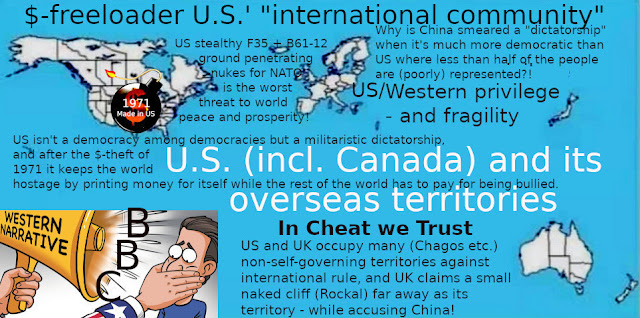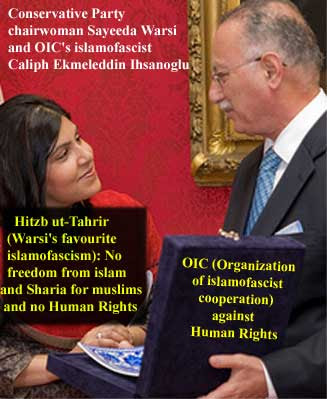To understand Myanmar/Burma you need to understand islam itself and muslim atrocities against Buddhists and others (will the Afgan Buddha statues be restored before even the Pyramids are destroyed by muslims?)
A one way ideology boosted by jihadism
What's your tolerance for an ideology that doesn't tolerate other ideologies and which has the worst historical track record of any known ideology, approves of slavery and sex apartheid, and says it's the best for mankind while simultaneously declaring that Human Rights that don't fit the ideology constitute a crime? An ideology that says that children to its male members reproduced by up to four wives simultaneously automatically become involuntary members and the possession of the father but that abandoning the ideology is considered the worst of crimes.
The global muslim “fertility war” which is made possible by the aid of islam's most basic tenets and sex segregation is furthermore assisted by violent or non-violent jihad against non-muslims and women.
However, although slavery in general has been the historical staple resource (which fact hasn't been helpful in avoiding anti-semitism) the key element has always been sex slavery.

From the Jewish slaughter of Canaanites to the muslim slaughter of Jews
It all started with the deeply racist idea about "God's chosen people". And to really emphasize this racist approach this "God" had to be the only "true" god. "Monotheism" is an utter oxymoron but still popular because of its usefulness.
However, when the Jewish Vagina (via Jews believing in Jesus) turned into the muslim Penis it started a development that ended in less than 10 Million Jews and more than 1.5 Billion muslims.
Such an elaborate ideological tool for expansionism as islam is by most standards (such as e.g. Human Rights) to be considered evil. And this is why islam has to be protected from itself via hypocritical bigotry and self denial.
-->
Sam
Westrop: In 2011, the British Government's review of the
PREVENT program, the state-funded counter-extremism initiative,
declared that providing taxpayers' money to moderate Islamists in
order to calm the "extreme" Islamists had not worked all
that well. The Government's report noted that "there have been
cases where groups whom we would now consider to support an extremist
ideology have received funding." This came as no surprise to
leading counter-extremism activists, who have long-warned about
Islamist organizations taking advantage of Government funding for
"interfaith" schemes – money and moral legitimacy to
which extremists quickly sign-up in order to shroud their more
nefarious activities.
In
2008, the Conservative MP Paul Goodman questioned the British
government's support for the Lokahi Foundation, which runs a
University interfaith project named Campusalam. Several hundred
thousand pounds of taxpayers' money was given to the Foundation,
which has previously associated itself with Muslim Brotherhood groups
such as the Cordoba Foundation and IslamExpo. The Islamist academic
Tariq Ramadan, whom the US has previously refused a visa, is on
Lokahi's advisory board. The journalist Lee Smith has described
Mr Ramadan – who has referred to the terrorist attacks of
September 11th, Bali and Madrid as nothing more than "interventions"
-- as a cold-blooded Islamist whose "cry of death to the West is
a quieter and gentler jihad, but it's still jihad."
It
is not just Government that is susceptible to exploitation. Rabbi
Wittenberg, a prominent Jewish leader in Britain, recently defended
his interfaith work with the East London Mosque and an interfaith
group called London Citizens. The deputy chair of London Citizens is
Junaid Ahmed, who has referred to senior Hamas terrorist Ismail
Haniyeh as "our leader".
As
for the East London Mosque, it is considered by many critics to be
one of the most extreme religious institutions in Europe: one does
not have to look far back through its events to find speakers who
denounce women, Jews and homosexuals. Featured guests have included
Sheikh Saad al-Beraik, who once stated:
"Muslim
Brothers in Palestine, do not have any mercy neither compassion on
the Jews, their blood, their money, their flesh. Their women are
yours to take, legitimately. God made them yours. Why don't you
enslave their women? Why don't you wage jihad? Why don't you pillage
them?"
Wittenberg
responded to criticism of his collaboration with these groups by
opining, "We have to take risks to engage with each other. The
Jewish community will be far weaker if we all shelter within a
comfort zone labeled 'They all hate us out there'."
Klevius comment: This is what you get with the lack of a long overdue serious reflection about "monotheism". Instead of floaters like Karen Armstrong and other women bowing "sacred" "god" ordered sexism, we need to put "god" himself on trial.
Jews and muslims usually cooperated in slave rading/trading hence explaining occasions of "peaceful coexistence".
Circumcision is the oldest Jewish ritual and its sole purpose was to hinder masturbation and support rapetivism so that as many girls/women got pregnant as possible while the offspring stayed Jewish.
This is what Klevius wrote 2005:
Islam's genocide attempt and enslavement of the Romas
The
Roma ancestors in India were enslaved and deported by islam some
thousand years ago. One of the worst islamic slave raiders/traders, when
it comes to Romas, being Mahmoud of Ghazna. But although this part of
the Roma history is the most important one it is less known/talked
about. Why is that? The stupid but widespread blinking of what islam
really stands for!The deceptive illusion/projection of "a nice islam"
In
Karen Armstrong's The History of God (1993 - the same year World Trade
Center got its first Islamic terror attack!) nothing at all is said
about the violent spreading and nature of islam (see battle/conquest
timeline), although she spends 40 pages praising Mohammad and the Koran!
This continuing tunnel vision is very typical for our time! Especially
many women seem to appreciate the in-built sexism in islam, perhaps
because it offers a convenient excuse for not daring to really step
outside (allow others to step outside)a limiting sex segregation.
Islam has destroyed everything non-islamic in its way because islam lacks anything to show itself due to its empty history
There never was any grave of Mohammed etc. That's why the Saudis have deliberately erased all traces of non-existing islamic "remains" and instead focused on the pagan Kaaba as the idol of the world's muslims combined with the Mina hate mongering stones.
By confusing islam with other forms of monotheist religions that aren't political ideologies islam has been able to get protection from Human Rights it hates and laws it wants to replace with Sharia.
The history of muslims in Myanmar is equally bloody and intrusive as in India and elsewhere
Suu Kyi has remained cautiously silent on the Rohingya muslims.Could the explanation be that the media picture presented is quite the opposite to the real problem, namely islam?
Some 80 to 90 died in recent clashes after a long period of muslim atrocities (including rapes) against Buddhists. Rohingyas launched the June 8 riot after their Friday prayer.
Evil racist/sexist islam is the root problem - applauded by islamofascist OIC and its Fuhrer Ekmeleddin Ihsanoglu
The root problem started with Arab slave raiders/traders some 1300 years ago (Dear reader, please educate yourself about the incomprehensible muslim atrocities in India/Bengali etc).
However, a more recent root is to be found when in 1946 (i.e. after the 1942 massacres committed by muslims) Bengalis requested self-rule under Sharia and wanted the area they occupied to belong to Pakistan.
In the last two years muslims have tried to chase Arakanese away from town in their own country by traumatizing them with a series of attack on Arakanese villages, not to mention gang rape and murder. Eventually Muslims launched the riot on June 8, 2012 when Arakanese people finally stood up and punished the rapists.
According to Mr.Kaiser, the Bangladesh Ambassador to Burma , in 1975 "there were upward of ½ million Bangalee trespassers in Arakan" and that the Burmese government had "some right" to eject over 500,000 "Bangalee trespassers" as the Ambassador described them - not "Rohingyas". Mr Kaiser subsequently became Bangladesh Ambassador to the UN and was Chairman of the UN Security Council for October 1979.
1984 the Citizenship Act was enacted with the aim to protect national security as the country is situated next to the world's most populous countries.
"Buthidaung, Burma : Some remote Buddhist villages in southern Buthidaung Township, 80 miles north of Sittwe, are under threat of damage due to the rampant Muslim robbers in the area, report local people widely.
A villager in Kwe Gomaw Village said, "The authority is not protecting our village right now. So many families are thinking of moving to more safe places like downtown Buthidaung, where many army battalions are stationed."
The village of Kwe Gomaw is located near Nyung Chaung Nasaka outpost in southern Buthidaung Township, and the village was hit by dacoits (muslim bandits) on 1 January, 2011.
"At 12 pm on 1 January, around 30 armed Muslim robbers surrounded our village. After that the robbers entered our village and robbed property from all the houses one by one. When a villager refused to give over his property, a robber beat him with his gun and injured his head. Properties worth 3 million kyat were taken by the robbers," the villager said.
After the robbers left the village, they hit another Buddhist village in the area, Thein Daung Byint, where many people of the Dynet tribes are living.
During the second attack, the village chairman's wife was severely wounded when some of the robbers opened fire on villagers who were trying to fight back against them. The woman is now hospitalized in Buthidaung in critical condition, although her condition is improving.
A villager from Thein Daung Byint said, "We are now afraid to live in our village because we have no safety, despite that our village is located in inner Buthidaung Township, not in the border area. Moreover, when we informed the Nasaka officers about the robber, the officers beat us because were unable to defend ourselves against the robbers. Now we are facing many difficulties living in our village."
During December, 2010, a large robbery also took place in Shwet Bying Village under Zaydi Bying circle in Rathidaung Township. The villagers lost 30 million kyat of property. The robbery was also committed by a group of armed Muslim dacoits.
The Muslim robbers have never robbed any Muslim villages in the area, having so far only struck Buddhist villages in Buthidaung Township. Because of this, many ordinary citizens, including those in the Muslim community, are anxious that the robberies might foment conflict and lead to riots among the people in the area."
They looked like East Indians, dressed like East Indians, were Muslims, did not speak the same language and did not assimilate with the locals who were Buddhists. This failure to assimilate or even dress similarly persists today and is a root cause of the problem, as it is in many places with Muslim people. They act like a state within a state,
In 1942 there was a Muslim uprising, followed by a lot of killing back and forth. In 1947 the “Bengali-Muslims’ Mujahid Insurgen-cy” as it is called by the Burmese, started after the central government refused to grant a separate Muslim state in Rakhine Pro-vence. Being better armed with WWII surplus, the Muslims killed many Burmese and destroyed villages in the north of the Pro-vence, near Bengal.
Martial Law was declared in 1948. During the uprising some of the Muslims flew the Pakistani flag and attempted to separate the northern provinces from Burma. The matter finally came to a head when some British government officials were murdered and the Burma Rifles were sent in. They decimated the Bengalis in combat.
To add sauce, the current Rohingya (Mujahid) political party was founded by elders who supported Burma jihad and separation ef-fort in 1947, which is hardly reassuring to the Burmese. Further-more, notwithstanding their defeat in 1948, a militant group auda-ciously continued calling themselves "Mujahids."
Myanmar does not recognize them as citizens or one of the 135 recognized ethnic groups living in the country. Much of this is rooted in their heritage in East Bengal, now called Bangladesh. Though many Rohingya have only known life in Myanmar, they are viewed by Rakhine's estimated three million Buddhists as intruders from across the border.
According to Human Rights Watch, the country's laws discriminate against the Rohingya, infringing on their rights to freedom of movement, education, and employment. They are denied land and property rights and ownership. The land on which they live can be taken away at any given time.
HRW has also accused security forces of opening fire on the Rohingya population during the recent wave of violence -- an accusation denied by the government.
What are the authorities doing?
In August, Myanmar's president, Thein Sein, announced that an internal commission, including representatives from different political parties and religious organizations, had been formed to investigate the recent sectarian violence -- a move welcomed by United Nations Secretary-General Ban Ki-moon.
"This commission is comprised of a representative cross-section of national figures in the country," Ban said in a statement. "It could make important contributions to restoring peace and harmony in the state and in creating a conducive environment for a more inclusive way forward to tackle the underlying causes of the violence, including the condition of the Muslim communities in Rakhine."
President Sein discussed the situation with Ban during the U.N. General Assembly in New York in September, pledging to "address the root causes of the tensions," according to a U.N. spokesman.
The move followed Sein's warning in June that the ongoing ethnic strife could harm Myanmar's development and stability as it continues its rehabilitation as a fledgling democracy.
What is the world saying?
Tomas Quintana, the U.N.'s human rights rapporteur for Myanmar, in August called for an independent investigation into allegations that authorities are using excessive force and committing other human rights violations while trying to restore order in Rakhine state.
Quintana said such an investigation was needed to guarantee accountability.
"Reconciliation will not be possible without this, and exaggerations and distortions will fill the vacuum to further fuel distrust and tensions between communities," he said.
Thousands of Rohingya have attempted to flee the unrest, with neighboring Bangladesh the main destination. But many have been turned away by the authorities.
Bangladesh has reinforced its border, amassing troops and security officials along the River Naf, which provides a natural boundary between the two countries, where rickety fishing boats filled with refugees attempt to cross over.
In June, Bangladeshi Foreign Minister Dipu Moni said her country was not willing to give shelter to anymore refugees, despite international calls to open its borders. "We're already burdened with thousands of Rohingya refugees staying in Bangladesh and we don't want anymore," she said.
Human Rights Watch says tens of thousands of Rohingya refugees are currently staying in makeshift camps in Bangladesh, with many living in conditions that seasoned aid workers have described as "the worst they have ever seen."
According to the rights group, the inhabitants face overcrowding, shortages of food leading to widespread malnourishment among the children, a lack of clean water and sanitation resulting in disease, and restrictions on movement coupled with extortion and human rights abuses.
Other comments
Bluhorizon
11/5/2012 8:23 PM EST
They remained active in several areas, trying to wrest northern Rakhine townships from Burma and become part of Pakistan. So, the matter of insurrection never quite went away.
Matters were finally brought to a head by the increasing Islamifi-cation of a few Roihynga, furthering the gap between the two cul-tures. Since matters were always sensitive, it did not take many bad apples to spoil everything and in a population of maybe 700,000 there were the inevitable hot-heads.
Many Rakhine Burmese believe there is a plan is to “convert us all to Islam and take over Rakhine.” There have been attacks on the Buddhists, forced conversions of some of their women, threats and attempts to expand Islamic influence, unsettlingly similar to what happened in the late 1940s. Some accuse Saudi fundamentalists of arming the region’s newly politicized Islamists to inspire jihad. Others accuse aide organizations of taking money from the Saudis and therefore are biased against the Buddhists. And of course the Roihynga have many similar claims of mistreatment and injustice.
The Rohingya seem to be the victim in this matter and clearly they are the ones currently persecuted. But a strong sympathetic case can be also be made for the native residents of Rakhine Provence, who are poor and had to endure virtually unrestricted illegal immigration of hundreds of thousands, approaching a million even poorer people from Bengal and endure several uprisings and jihad. The huge population increase of the Muslims has exacerbated the situation. As you can see, this problem and its roots are complex but the hatred and vehemence are strangely reminiscent of the Israeli-Palestine conflict.
It is easy for armchair diplomats to make accusations one way or the other but placing blame now is clearly a matter of opinion, not fact. In this case (as is so often the case) there is plenty of blame to go around and no good solution in sight. Neighboring Bangla-desh has refugees up to the eyeballs and will take no more. There is no place for the Roihynga to go and it is unlikely that they can ever return to their homes. Of course the very worst of all the bad choices would be jihad.
Bluhorizon
11/5/2012 8:22 PM EST
The article is the view of a Pakistani and as is so often the case the oppressed Muslims are shrouded in the mantel of the belligerent victim--but the root causes of the problem are not really addressed.
My first experience in the area of West Burma began in 2003 when I went there for WHO to administer TB tests. Coming from Thailand, it was graphic how decidedly poorer the people in W Burma were compared to Thailand. From the first I could see that the Roihynga were a distinct group, which dressed and looked different from the native Burmese.
The Rohingya have immigrated from Bengal, SW India, later called East Pakistan, now Bangladesh, for at least 150 years and this was made easy by lack of border enforcement. Originally called "Bengali-Muslims", the name "Rohingya" came from antiquity and was adopted about 1960 as a way of identifying themselves as an ethnic group rather than immigrants.
Who is a citizen is at this point quite impossible to say. Burma is a country that does not confer automatic citizenship on people borne of immigrants and the Burmese do not accept Roihybnga as citizens.
This attitude about citizenship may be in conflict with western standards but most Muslim countries and some others also do not confer citizenship automatically upon birth. A 1984 law formally excluded the Rohingya as one of the country's 135 ethnicities, meaning most are denied basic civil rights and are not recognized as citizens.
One might say the Bengalis were "invited" into Burma by lack of border enforcement, but things never went well from the start. They looked like East Indians, dressed like East Indians, were Muslims, did not speak the same language and did not assimilate with the locals who were Buddhists. This failure to assimilate or even dress similarly persists today and is a root cause of the problem, as it is in many places with Muslim people. They act like a state within a state,
.
.
.
.

















































































































































